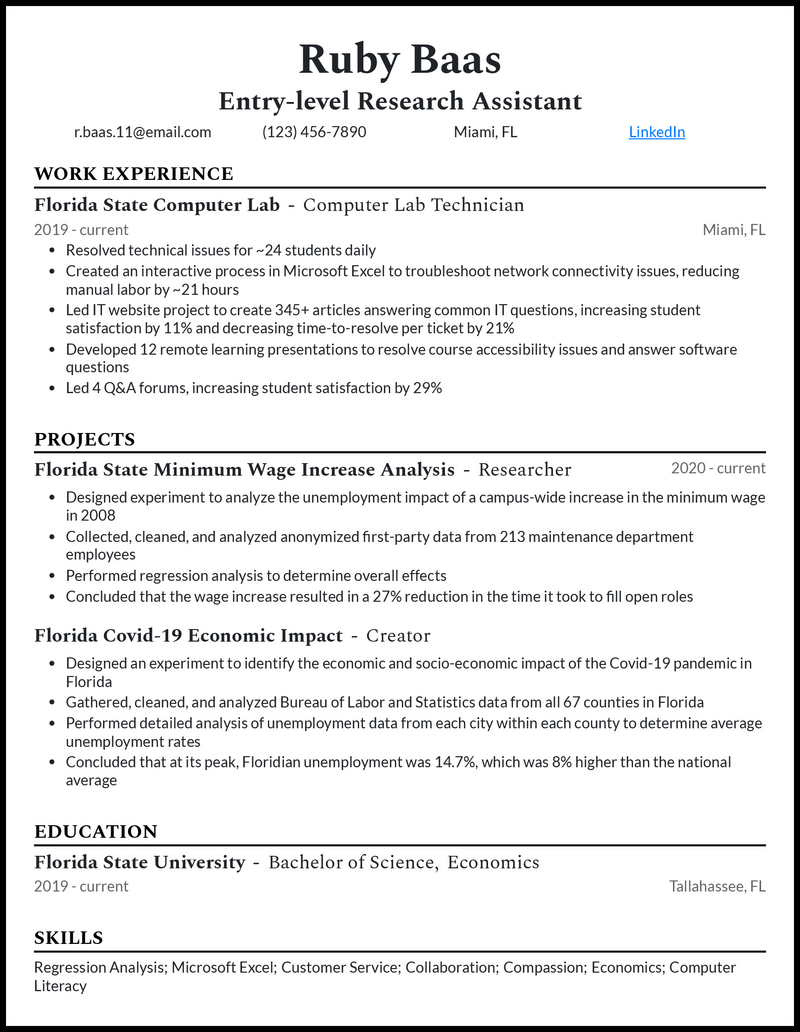You have a talent for sifting through swaths of data and interpreting it. Your sharp eye for detail and knack for spotting trends in complex datasets make you an invaluable asset to any research team.
However, to secure that entry-level research assistant job you’re after, possessing these skills isn’t enough: you also need to make a resume that effectively communicates your value.
Your dream job is within reach, and we’re here to help. Our cover letter writing advice and entry-level research assistant resume templates have helped candidates like you break into the world of research.
Why this resume works
- Sure, you’re fresh off the boat, but that doesn’t mean you’re not the best person for the job. The evidence? An entry level research assistant resume showcasing your professional abilities is the ace you need up your sleeve.
- Whip up an excellent mix of soft, hard, and technical skills (regression analysis, customer service, Microsoft Excel, collaboration, and compassion) to paint a beautiful portrait of a well-rounded candidate the recruiters will want to hire on the spot.
What Matters Most: Your Research Skills & Experience

As an entry-level research assistant, your soft skills, such as your keen attention to detail and strong critical thinking, are important—but they don’t mean much without the technical know-how to complement them.
Use the skills section of your resume primarily to highlight your technical expertise, and include a few soft skills that enhance it. Show recruiters how you excel at analyzing data with SPSS, and have the communication skills to boot, giving you an edge when you present your analyses.
When you list your technical skills, try to be specific. If you’re great at data analysis, mention it in tandem with the tools you’re familiar with, such as R or MATLAB.
Similarly, emphasize soft skills that boost your value as a research assistant, like your ability to work effectively in a team, or your aptitude for experimental procedure.
9 popular entry-level research assistant skills
- Data Analysis
- SPSS
- Microsoft Excel
- Literature Reviews
- MATLAB
- Database Management
- Presentation Skills
- Project Management
- Critical Thinking
Sample entry-level research assistant work experience bullet points
As someone seeking an entry-level research assistant role, you may not necessarily have much on-the-job work experience. Instead, use this section to highlight transferable skills, such as leveraging MATLAB to interpret massive datasets for educational purposes and presenting your findings to professors and peers.
You and complex data are best friends, so use that to your advantage. The key to making your experience pop is to use quantifiable metrics.
Perhaps you headed up an initiative to boost the efficiency of a research project by 25%, or maybe you’ve processed thousands of datasets in Python. Use metrics like these that show recruiters how central you were to these projects and how valuable you can be to theirs.
Here are a few ideas from some of our resume samples:
- Spearheaded literature reviews on 50+ sources for a research project, building the project’s knowledge base
- Analyzed survey data from over 1,500 respondents using SPSS, resulting in a 15% increase in project efficiency
- Streamlined data collection procedures for an ongoing research project, leading to a 22% decrease in data collection time
- Presented research findings across 4 departments, showing effective communication and presentation skills
Top 5 Tips for Your Entry-Level Research Assistant Resume
- Highlight your transferable skills
- Drawing parallels between the job and your past experience is a great way to show a recruiter you can hit the ground running. For example, if the job you’re applying to emphasizes data analysis, talk about the regression analyses you’ve run in R in college.
- Showcase critical thinking
- Research requires quick recognition of unusable data. Talk about when you spotted the inconsistently controlled variable in survey data and made a breakthrough on your research project soon after discarding it.
- Show you’re a team player
- Being a research assistant is all about working effectively in a team, so don’t be afraid to mention those times you’ve worked on group research projects—for bonus points, quantify the impact you had on these, too.
- Keep it brief
- Recruiters go through hundreds of resumes daily, so include only your best and most relevant achievements. Keep your resume under a page, and save the deep dive for your cover letter.
- Use career objectives to help plug gaps
- Entry-level resumes are one of the few places where career objectives are worth including. If your resume is sparse, adding a carefully written objective can help add some personality to it—but make sure to update it to match the job you’re applying for.
Draw parallels between your experience and what the job description calls for. For example, if the job requires keen database management, talk about your experience using SQL to analyze trends within vast databases.
Yes! As an entry-level role, your education section and any relevant extra training you’ve had will be central to your application. If you have additional qualifications in Python or project management, include them on your resume. Good resume templates let you add a section just for certifications.
Use your cover letter to discuss anything you couldn’t fit into your resume. Dive deeper into your specific areas of interest within your chosen field of research, and where possible, try to tie them into the job you’re applying to.




![5 Entry-Level Research Assistant Resume Examples [& Templates]](https://beamjobs.wpenginepowered.com/wp-content/uploads/2023/04/entry-level-research-assistant-professional-resume-example.png)





